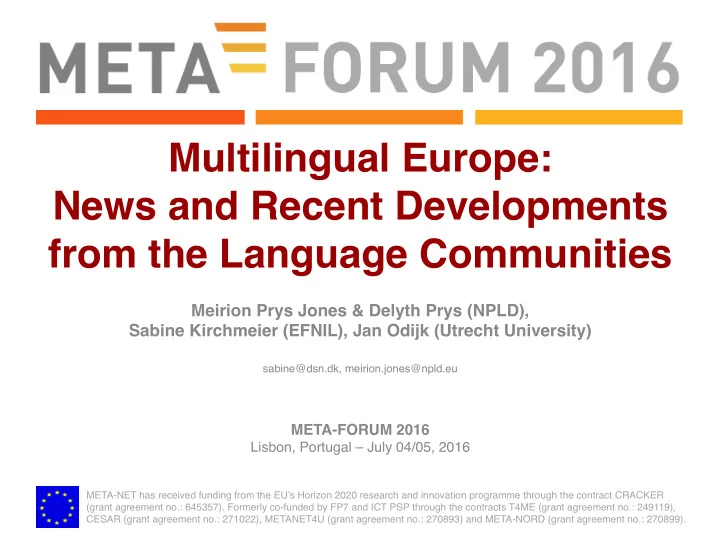

Multilingual Europe: News and Recent Developments from the Language Communities Meirion Prys Jones & Delyth Prys (NPLD), Sabine Kirchmeier (EFNIL), Jan Odijk (Utrecht University) sabine@dsn.dk, meirion.jones@npld.eu META-FORUM 2016 Lisbon, Portugal – July 04/05, 2016 META-NET has received funding from the EU’s Horizon 2020 research and innovation programme through the contract CRACKER (grant agreement no.: 645357). Formerly co-funded by FP7 and ICT PSP through the contracts T4ME (grant agreement no.: 249119), CESAR (grant agreement no.: 271022), METANET4U (grant agreement no.: 270893) and META-NORD (grant agreement no.: 270899).
Outline q Language technology for regional and minority languages (Joint position paper - NPLD) q Language technology for official state languages (Joint position paper - EFNIL) q Practical aspects of Language technology and multilingualism for citizens using regional and minority languages (NPLD) q A strategic approach for strengthening development of Language Technology and multilingual tools for a language (Utrecht University) q Discussion http://www.meta-net.eu 2
http://www.meta-net.eu 3
EFNIL: 38 member organisations from 28 countries http://www.meta-net.eu 4
About EFNIL EFNIL is pursuing the following goals: q The collection and exchange of information about the officially recognised standard languages of the EU and other official European languages; q The provision of expert advice about language policy in the EU; q The preservation of linguistic diversity within Europe; q The promotion of plurilingualism amongst the citizens of the EU states. The Federation also maintains an interest in the minority and regional languages of Europe. http://www.meta-net.eu 5
EFNIL activities q Projects relating to the description and analysis of the current linguistic situation within the EU as well as implications for longer-term linguistic development § European Language Monitor http://efnil.org/projects/elm § LLE – Language Legislation in Europe http://efnil.org/projects/lle q Scientifically based analysis of cross-state language problems and questions of language policy q Consultation services in the field of language policy for political decision makers of the EU institutions and member states q Propagation of the cultural and practical benefits of European linguistic diversity and plurilingualism through relevant actions and publications q All other activities which contribute to its aims. http://www.meta-net.eu 6
EFNIL and NPLD joint position paper Key points 1. It’s not only about the money q The potential of language technology will increase dramatically across the world in the coming years. If Europe wishes to become a world leader it must invest now in being at the forefront of developing language technologies. Through a focused, concerted, major interdisciplinary LT research effort, Europe can develop a new stronger position in terms of industry and at the same time preserve its precious languages. http://www.meta-net.eu 7
Key points 2. We need to have a strategic approach The basic building blocks for the development of language technology will q be vital components for the future developments within the IT revolution. The countries and regions of Europe as well as the European Union need to ensure that the necessary strategies and conditions for new developments are in place for all the languages of Europe. 3. It’s a matter of democracy Language technology will also help Europe to ensure citizens’ rights, as it q provides means for all Europeans to communicate with public bodies and have access to public web services in their preferred language, regardless of what status this language enjoys. Steps have already been taken by the EU in the ELRC-project sharing EU’s machine translation technologies with public institutions of member states, but countries need to cooperate more and to develop measures to make sure that all languages are taken into account. http://www.meta-net.eu 8
Key points 4. A multilingual strategy will not only benefit the languages - it is a driving force for research and development. Linking a positive and inclusive policy regarding multilingualism and linguistic q diversity with strategic investments in the development of language technology for the Digital Single Market will bring about a quantum leap in the evolution of IT; putting Europe in a leading position in a core requirement. 5. Nobody should be left behind Developing the potential of the voice within new technologies will be a key q development in the future. All languages should be able to share in these new developments and should be able to benefit equally from this new revolution in terms of communication. In order to fully realize the potential of a single digital space and market place, q language technologies, need to be developed for all the languages of Europe – national, regional or minority languages – to encourage the free flow of information, ideas and knowledge and to ensure the spread of goods and innovations to all citizens. Language agnostic technologies must also be rolled out to ensure the inclusion of European languages in technologies which already exist. http://www.meta-net.eu 9
Some thoughts q There is no big difference between national languages and regional and minority languages – but size matters. q We need to create awareness in our countries. Governmental digitisation strategies still primarily focus on the technical infrastructure (hardware, cables, data transmission speed, storage, security, getting everyone connected) – not on the content that is being transferred and needs to be understood. q The need for translation technology is growing – especially to and from non-European languages. q The lesser the resources – the stronger the need for a strategic approach. http://www.meta-net.eu 10
META-NET (2012) Speech and text Speech resources processing Machine translation Text analysis
Recommend
More recommend